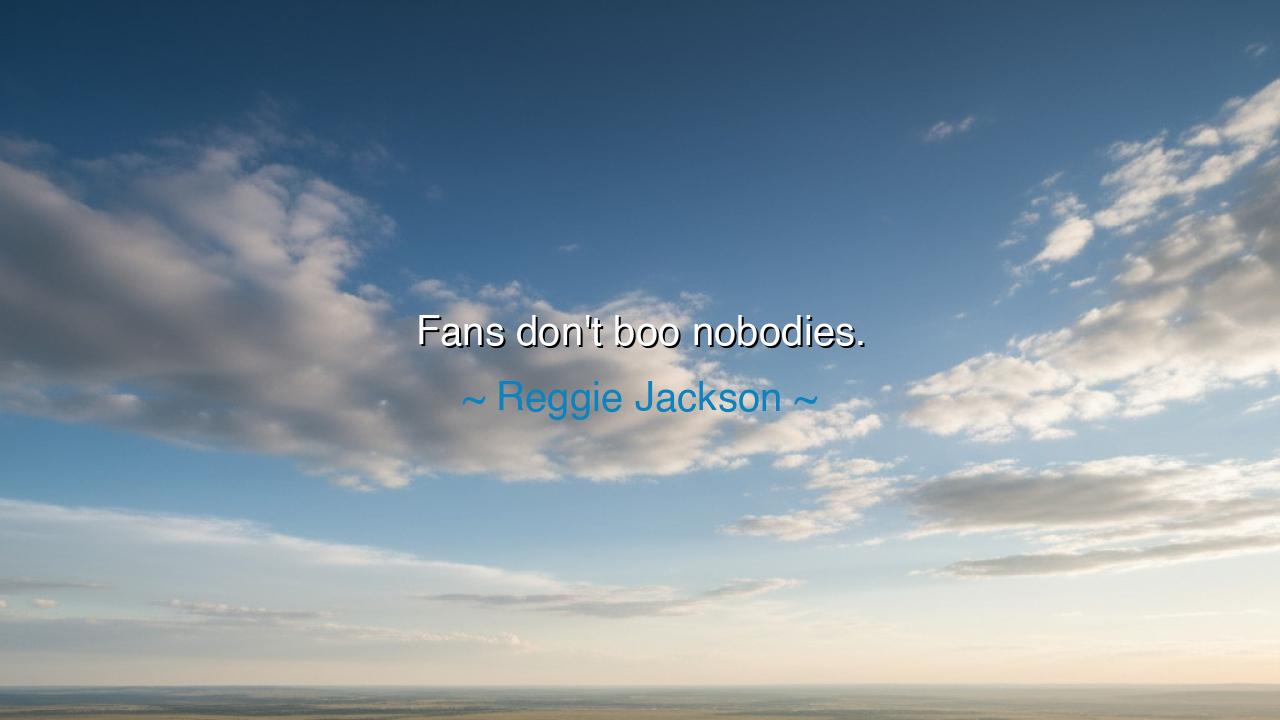
Fans don't boo nobodies.






In the annals of the game, when the roar of the crowd could lift a man to glory or bury him in scorn, Reggie Jackson, the man they called “Mr. October,” spoke a truth that has thundered through time: “Fans don’t boo nobodies.” At first, these words may sound proud, even defiant, but beneath them lies a profound wisdom about greatness, envy, and the price of being seen.
For when the fans boo, it is not the faceless journeyman who receives their wrath, but the one whose deeds command attention. The crowd does not waste its voice on the unnoticed, on the unremarkable. They jeer only those whose power or presence is so great that it stirs in them love or hatred, awe or envy. To be booed, then, is not merely to be rejected—it is to be acknowledged as one who matters. Jackson’s words remind us that the measure of importance is not in silence, but in the noise of passion, whether it be praise or condemnation.
The ancients too knew this law. Recall the tale of Socrates, who walked the streets of Athens asking questions that unsettled the comfortable and challenged the mighty. He was mocked, resisted, and ultimately condemned. Yet why did they rage against him? Because he mattered. His words pierced too deeply to be ignored. If he were a nobody, Athens would have passed him by with indifference. But because his voice shook the foundations, they booed, and in booing, they revealed his power.
Reggie Jackson himself lived this truth. In his career, his bat struck with fury in October, delivering home runs that altered destinies. But with his greatness came controversy, arrogance to some, confidence to others. Crowds booed him as loudly as they cheered him, for he was never invisible. He bore the weight of expectation, and when he failed, the wrath was fierce. Yet Jackson understood: better to be booed for striving at the highest stage than to be ignored as a shadow on the field.
There is a hidden strength in this perspective. To be booed is to be tested, to stand in the fire of public opinion without breaking. Many crave applause but shrink from criticism. But the true hero learns to take both, to know that hatred and love are born from the same place: significance. The boo is not the opposite of greatness, but a mirror of it. Only the forgettable escape it, and obscurity is no crown worth seeking.
So what lesson shall we take? If you are striving toward greatness, expect the boos. Do not be shaken by them, for they are proof that your work has stirred the world. To be criticized, mocked, or envied is a sign that you have risen high enough to be seen. Better to be attacked for being bold than ignored for being nothing. Stand firm, as Reggie Jackson stood firm, knowing that the noise of the crowd, whether in cheer or in scorn, is the song sung only for the few who dare.
Therefore, let this truth be passed down: “Fans don’t boo nobodies.” In your own life, seek not the safety of silence, but the challenge of visibility. Dare to be great, and accept both the cheers and the jeers as signs that you matter. For obscurity is easy, but legacy belongs only to those who endure the roar of the crowd. And when you hear the boos, smile—for in that sound is hidden the proof that you are not a nobody, but someone who dared to rise.






AAdministratorAdministrator
Welcome, honored guests. Please leave a comment, we will respond soon